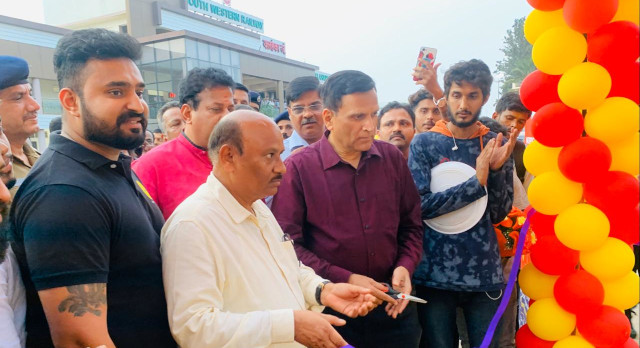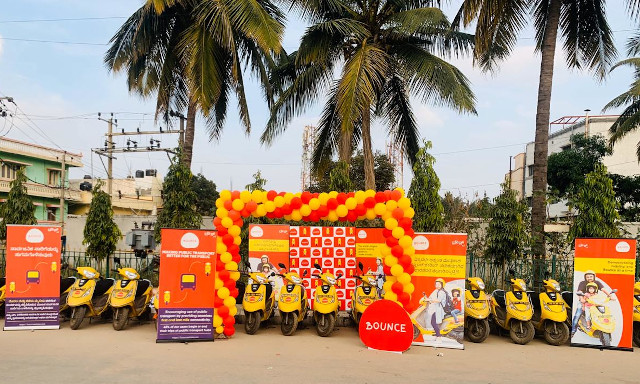Bengaluru, December 27, 2019: Bounce, India’s first and fastest growing dockless scooter sharing service today announced its partnership with the Bengaluru Railway Division; plans to introduce 698 scooters at 13 Bengaluru railway station. Chief guest Mr. Ajay Kumar Singh – GM, Mr. Krishna Reddy – Sr. DCM Southwestern Railway, Mr. Vishwanath – MLA, Yelahanka and DRM, along with other senior officials from railways inaugurated the Bounce hub at Yelahanka. Bounce scooters will make their debut at Bellandur, Yelahanka, Banaswadi, Hoodi Halt, Whitefield, Nayandahalli, Yeshwanthpur, Kengeri, Krishnarajapuram, Bangalore Cantonment, Bangalore East, Baiyappanahalli and Malleswaram shortly. Parking lots have been allotted at two entrances in each of these stations, to pick up or drop off Bounce bikes.

Since the last two years, there has been a significant increase in the number of people using the suburban rail service. It is particularly popular among office-goers looking to avoid traffic. This year 1.5 lakh passengers opted to travel by the South Western Railway’s intracity trains, an increase from 1.4 lakh passengers in 2016-17. This increase is an encouraging sign; as per a recent proposal by RITES, the suburban trains are projected to have a total daily ridership of 9.28 lakh in 2025. At a time, when hours spent commuting have gone up because of traffic congestion, suburban railway act as a cheap and fast alternative for long commute. However, first and last mile connectivity is still a critical issue. Bengaluru railways see lakhs of people coming in or going out of the city from various stations. The city’s fragmented transport system and evolving public transport impacts a sizable number of these travellers. A recent survey showed that 70% of citizens in Bengaluru felt the need for improving first and last mile connectivity.
Bounce’s partnership with the Bengaluru Railway Division is in line with the government’s objective to build a robust intracity commute network to address the city’s long-term traffic needs. By providing accessible and reliable shared bike service from the premise of railway stations, Bounce aims to improve connectivity and encourage citizens to use railway services. Integration of hired, shared and public transport services will ensure all modes of commute complement each other and provide a seamless experience to citizens.
Vivekananda Hallekere, CEO and Co-founder of Bounce said, “Our mission is to work with the existing mobility options and disrupt it through technological intervention & innovation. With the load on road infrastructure there is an urgent need to shift away from personal mobility to public transportation and shared mobility. To increase adoption of public transportation, it’s imperative to create integrated multimodal connectivity to make daily commute seamless. We’re happy to be working with authorities such as Bengaluru Railway Division, who recognize the importance of shared mobility services and enable us further to provide accessible mobility. This is happening for the first time ever in the country and we are positive that it’ll help lakhs of railway commuters with their first and last mile commute.”

Bounce’s vision is to enable public transportation as a primary route to commute and thereby decongest the city. To achieve this, the company has partnered with three Mass Rapid Transport systems – Namma Metro, Hyderabad Metro and Nagpur Metro. Within a year, 42% of Bounce rides either originated or culminated at Namma Metro; around 40,000 of the nearly 1 lakh daily rides undertaken have been Metro commuters. Headquartered in Bengaluru, Bounce currently operates in the city with 13,000 dockless scooters and has presence in over 35 cities in rental/docked model. Bikes are enabled with latest tech solutions like Bluetooth helmets, tilt and tow sensors, in addition to features like GPS tagging, Geo fencing and sensors that alert the team in case of a crash or battery tampering. Bounce heavily invests in technology to ensure the safety of its users as well as vehicles. The company believes that access to mobility should be a fundamental right and is looking at making commute so cheap that its almost free.




